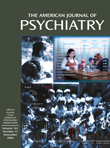Riluzole Augmentation for Treatment-Resistant Depression
To the Editor: Glutamate is implicated in the pathophysiology and treatment of mood disorders (1). The following case reports pertain to the use of riluzole, a putative antiglutamatergic agent indicated for the treatment of amyotrophic lateral sclerosis, as add-on therapy for treatment-resistant major depressive disorder.
Ms. A was a 42-year-old woman with a history of major depressive disorder. Despite pharmacotherapy strategies, including fluoxetine, fluoxetine augmented with lithium, and her current regimen of bupropion (100 mg b.i.d.) and venlafaxine (up to 300 mg/day), she remained depressed, with scores of 21 on the 25-item Hamilton Depression Rating Scale and 17 on the Beck Depression Inventory. After we obtained written informed consent, riluzole, 50 mg b.i.d., was added to her current medication regimen. Within 1 week, her Hamilton depression scale and Beck Depression Inventory scores decreased by 16 and 10 points, respectively. Repeated measures of her depression severity reflected scores in the remitted range, with a score of 1 on the Hamilton depression scale and 0 on the Beck Depression Inventory at the end of 6 weeks and a Hamilton depression scale score of 4 and a Beck Depression Inventory score of 4 at the end of 12 weeks of continued treatment.
Ms. B was a 55-year-old woman with a 33-year history of major depressive disorder. Her pharmacotherapy history included adequate courses of various tricyclic and selective serotonin reuptake inhibitor monotherapies, nefazodone, and the combination of sertraline and bupropion. Immediately after an index course of seven bifrontal ECT treatments, her Beck Depression Inventory score was 15; however, within 2 weeks, her score rose to 32 despite continued weekly ECT treatments. For the previous 6 months, while her mood was maintained with fluoxetine (80 mg/day), methylphenidate (58 mg/day), and ongoing cognitive behavior therapy, her Beck Depression Inventory scores fluctuated between 17 and 31. After we obtained written informed consent, treatment with riluzole, 50 mg b.i.d., was started. Ms. B’s Hamilton depression scale and Beck Depression Inventory scores before riluzole were 34 and 27, respectively. Within 1 week, her Hamilton depression scale score dropped to 22, and her Beck Depression Inventory score decreased to 11. At week 6, her Hamilton depression scale and Beck Depression Inventory scores were both 7; at week 12, her scores were 9 and 5, respectively.
Baseline laboratory evaluations, including liver function tests and a CBC with differential, were collected before study initiation. Additional tests were performed at 2–3-week intervals for 12 weeks and then monthly to monitor riluzole’s known risk of serum aminotransferase elevations and neutropenia. Neither patient experienced significant aminotransferase elevations (more than five times the normal upper limits) or neutropenia or endorsed any other side effect.
Although case studies necessitate cautious interpretation, these results are consistent with a recent finding suggesting riluzole’s effectiveness in treating depression (2) and further substantiate accruing evidence indicating that several classes of glutamatergic agents possess antidepressant properties (3).
1. Sanacora G, Rothman DL, Mason GF, Krystal JH: Clinical studies implementing glutamate neurotransmission in mood disorders. Ann NY Acad Sci 2003; 1003:292–308Crossref, Medline, Google Scholar
2. Zarate CA Jr, Payne JL, Quiroz J, Sporn J, Denicoff KK, Luckenbaugh D, Charney DS, Manji HK: An open-label trial of riluzole in patients with treatment-resistant major depression. Am J Psychiatry 2004; 161:171–174Link, Google Scholar
3. Paul IA, Skolnick P: Glutamate and depression: clinical and preclinical studies. Ann NY Acad Sci 2003; 1003:252–270Crossref, Google Scholar



